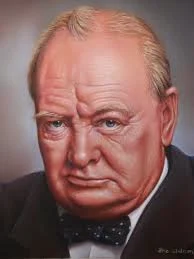Winston Churchill (1874 - 1965)
Winston Churchill always cut right to the quick.
Consider the alternatives he proposed here as regards FREE enterprise. These are simple and easy to understand.
What is a predatory tiger and why would it be shot? The predatory tiger sneaks up onto an unsuspecting victim, grabs it and hauls it off for food. It keeps its catch for itself, to do with as it will. Obviously if such a tiger, doing what it is supposed to do, invades places it should not, like a village, and takes weak victims unable to defend themselves, this practice has to stop. This tiger has gotten out of its normal bounds, and has gotten used to its easy source of prey. It will not stop unless it is stopped. So it must be shot.
The term "free enterprise" contains the word FREE! Freedom is not predatory, does not slink around and take for itself in a sneaky way. If a practitioner of FREE enterprise does something long term that is not in tune with the law or proper business practice, like a scammer or a snake-oil sales man, the market will grind him out. They do not last long. They are eventually found out and people choose not to give any more toward their efforts.
FREE enterprise survives in the long run, and grows.
It is accepted and develops a legacy. It should not be hunted and shot.
Oh, how many think that FREE enterprise is a place to sidle up to and take at will!? Gubments, which have nothing that isn't taken first from somewhere else, are the best practitioners of the hook on and suckle approach! And who does gubment get to go along with its actions? Certainly those in the bureaucracy it creates to manage and administer the milk! That is a group that forever grows. But there are others!
Who? Those gubment politically convinces are deserving of a portion of the milk, groups who feel entitled in fact, and gubment designs a portion intended to keep those so convinced to stay on. The portion is never enough to be able to go away on its own. The portion is insidious, which means designed to gradually entrap. And like frogs in the slowly-heating water they oftentimes find themselves unable to jump out.
And the word FREE in free enterprise takes on a different meaning! What so many do not understand is that the free lunch is never FREE. It must be paid for, somehow, somewhere, sometime by someone!
FREE enterprise survives in the long run, and grows.
It will continue to grow if it is not drained by those who, like gubments, feel to derive windfall profits from its success.
If FREE enterprise was instead seen by most, if not all, as a healthy horse pulling a sturdy wagon - think of the images this brings to mind! Healthy horses are kept that way through great care, devotion and love. Sturdy wagons are built for the long haul, cleaned and oiled, and maintained to do its job.
FREE enterprise does not have to be gotten rid of (shot)!
FREE enterprise does not work if drained of more and more of its bounty (suckled)!
FREE enterprise is the workhorse that keeps private property intact and protected, individual rights supported and protected, and the pursuit of happiness abundant!
John Adams died on the same day as Thomas Jefferson, exactly 50 years after the signing of the United States Constitution. Adams knew he was dying, but felt happy in the knowledge that Jefferson would remain to carry on the great objective of individual freedom and individual rights. His last words were, "Jefferson survives!" Not knowing Jefferson's fate, after a long life Adams died happy and confident that freedom was left for his country to benefit from.
Would it not be wonderful if we, too, after a long life, could feel happy and confident that FREE ENTERPRISE would indeed remain to be enjoyed and carry on its great objectives?
Would it not be wonderful if we, too, after a long life, could happily and confidently say -
FREE ENTERPRISE SURVIVES!



